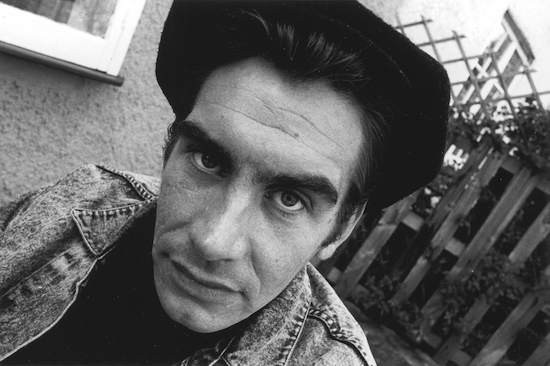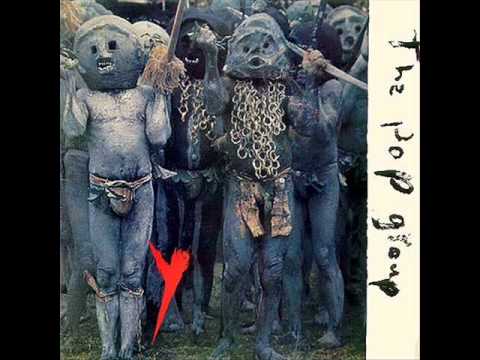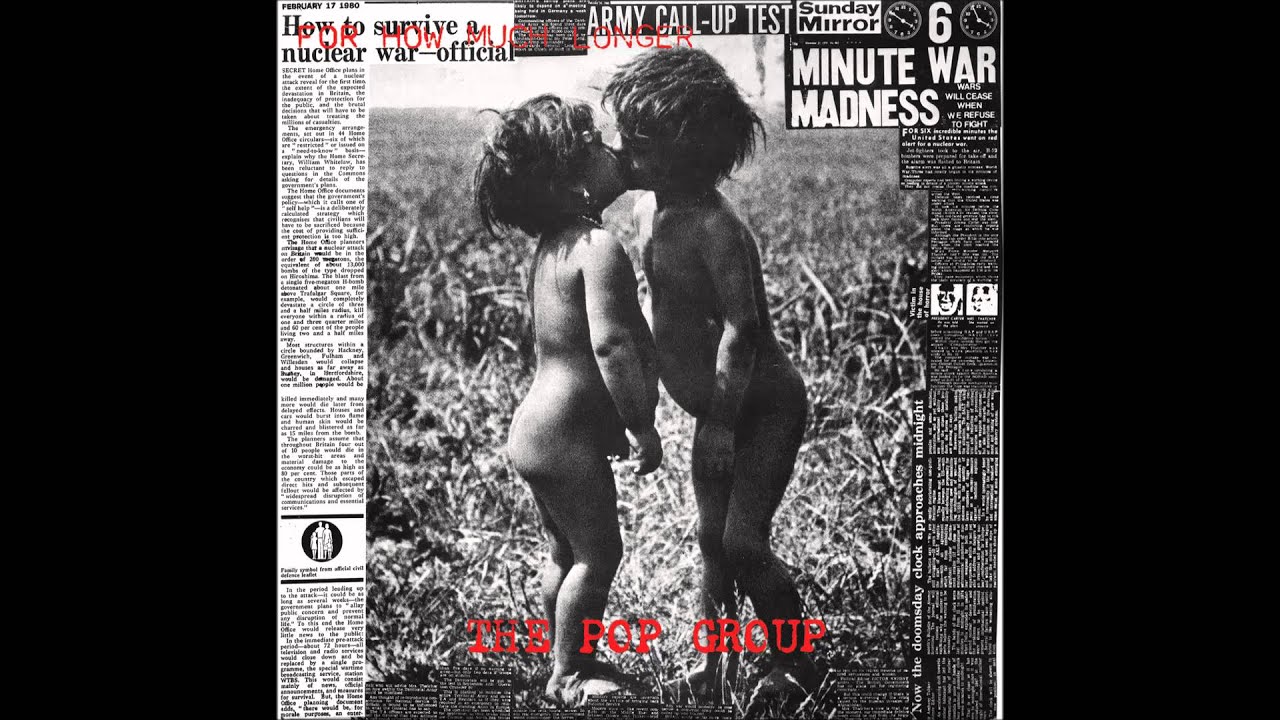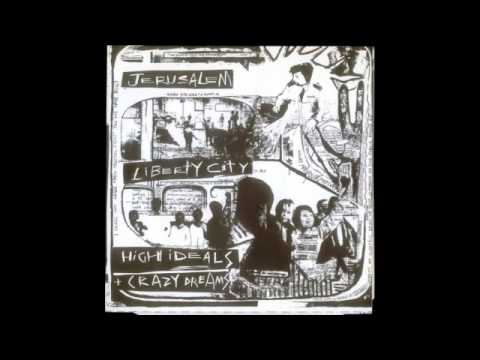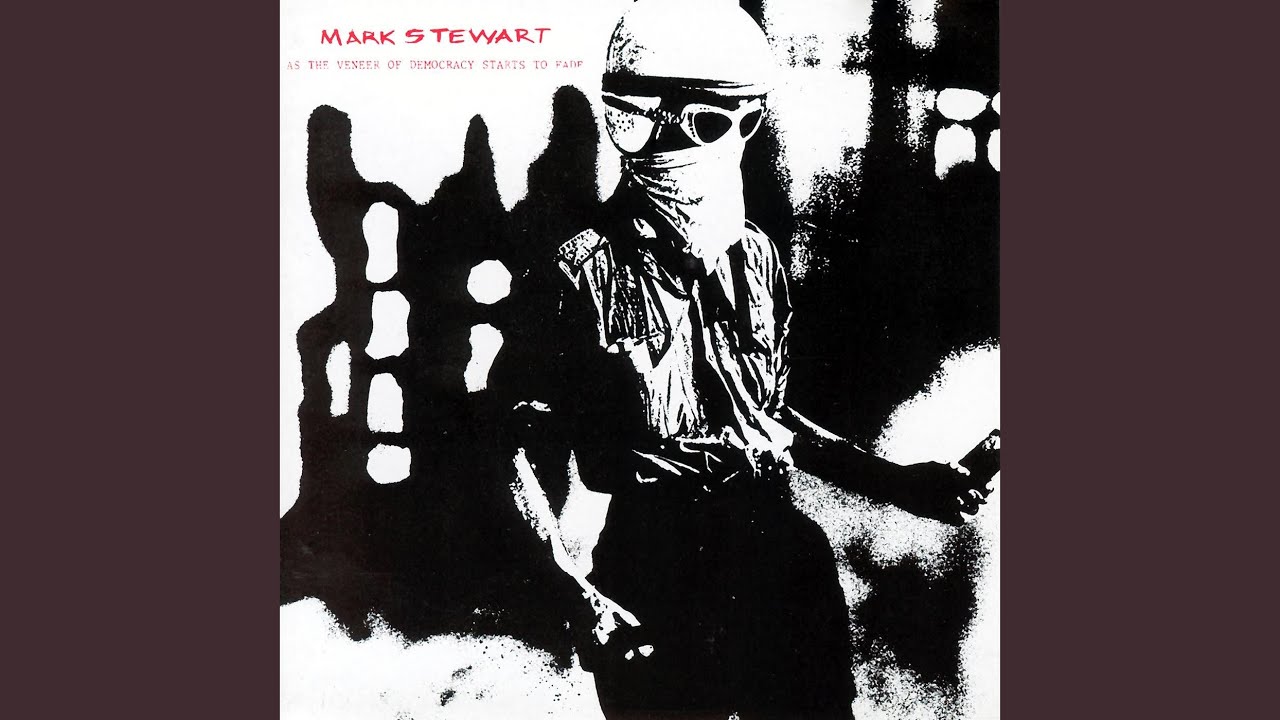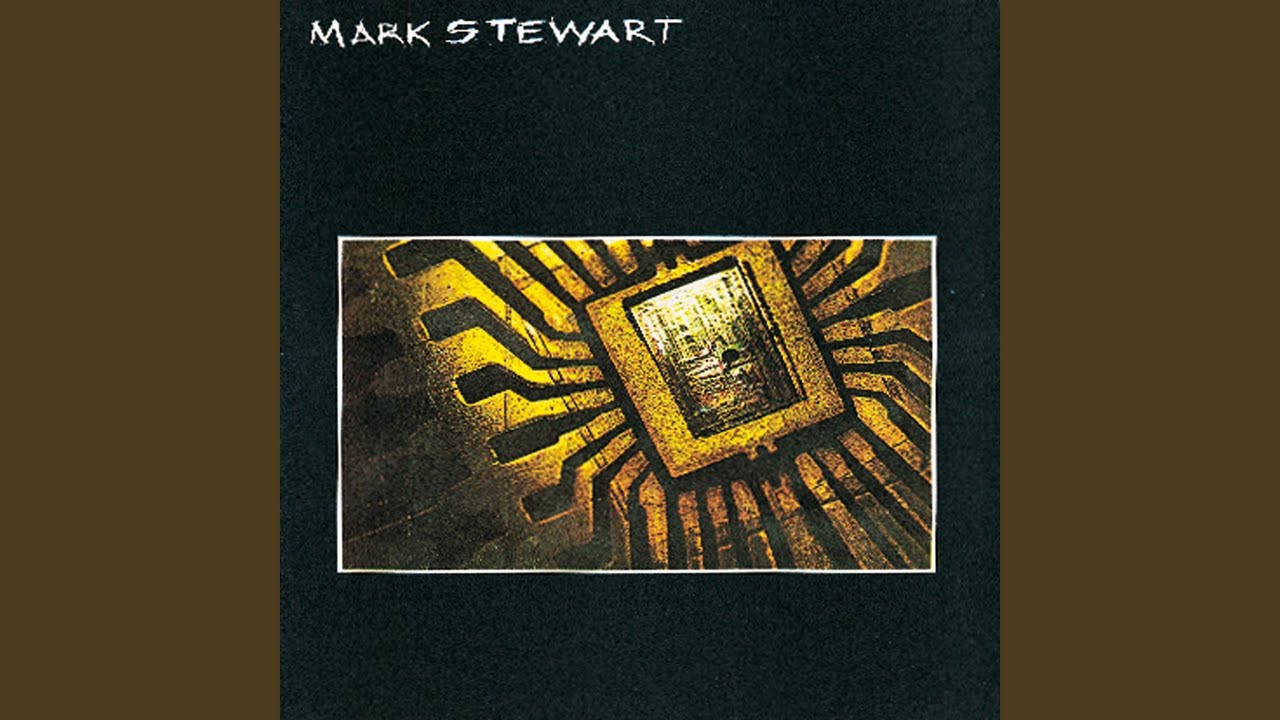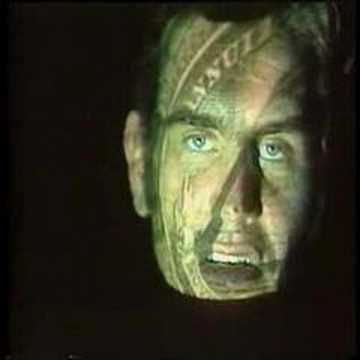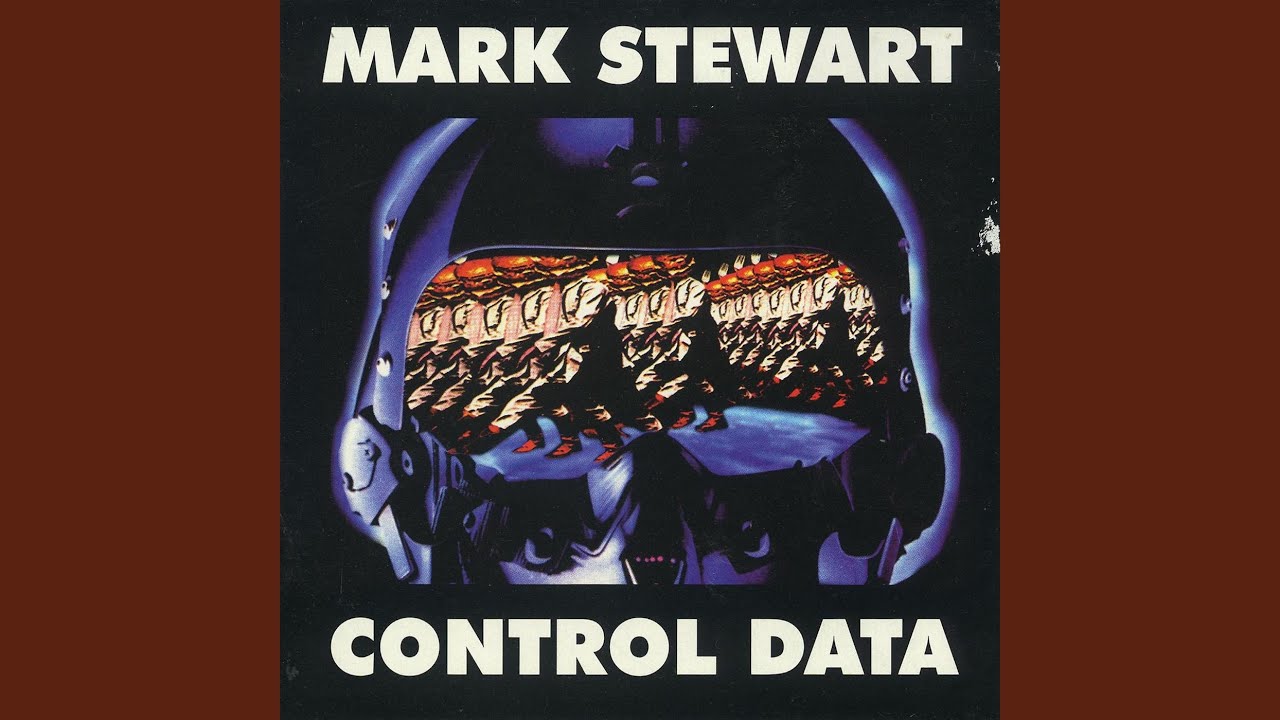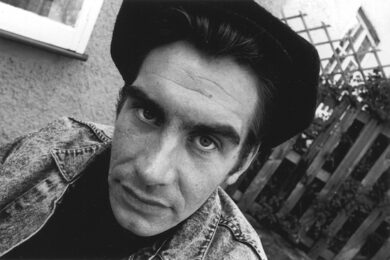Portrait by Beezer
Mark Stewart and Gareth Sager of The Pop Group play live at Sea Change Festival Totnes 24 – 26 May
"Perhaps we should FaceTime. I’m in a Mexican wrestling mask right now. Do you cosplay?"
Mark Stewart and I have been on the phone for less than five minutes, having had no prior contact, and he’s already ribbing me mercilessly. What is this guy, my uncle or something? For someone whose music has been sometimes unfairly pegged as "too serious", he sure loves cracking jokes. I tell him that he’s really on the vanguard of modern interview techniques. "Story of my life. I’ve heard that I’m ‘in the vanguard’ in eight different languages: Laguardia, Influenza…"
It’s true, though: since forming the Pop Group as a teenager in Bristol, Stewart has been working a step or ten ahead of the game, when he’s not playing a different sport altogether. That band were one of a precious few who truly took punk movement’s anarchistic principles to heart sonically, grafting free jazz squall and Burroughsian cut-ups onto dub’s liquid rhythms to create some of the most confounding, thrilling body music of the day. Stewart’s caterwauling presence out front was the spice that brought the stew together, his lyrical preoccupations wedged somewhere between McLuhan and Artaud (not bad for someone who hadn’t yet done their A-levels at the band’s outset). They’ve reunited in the last decade and, not being too keen on pandering to the nostalgia industry, have made new music that acknowledges their shared past without shamelessly wallowing in it.
After the Pop Group’s initial split in 1981, Stewart started a fruitful partnership with dub madman Adrian Sherwood, who has produced most of Stewart’s work under his own name and with comrades the Maffia. Though less widely discussed than his first group, the Maffia’s thumping cacophony presaged everything from Nine Inch Nails to Death Grips; their first album, Learning To Cope With Cowardice, was reissued in January on Mute, with a full second album of previously unheard material, The Lost Tapes, appended, and it sounds as heavy and alien as ever.
Over two hours — needless to say, this has been edited for space and clarity — Stewart and I took many side roads to get to these musical highlights, from corporate wokeness ("Naked capitalists are using social issues as a sort of ethics dressing to sell things; everything is wrapped in green, leftist clothing nowadays") to dumpster diving ("Here, we call it skip-surfing. The thing is to not fall asleep in the skip, so you don’t get incinerated or put in the crusher. Looking back on my career, that’s the only thing I’ve learned: don’t fall asleep in a skip"). Stewart’s very aware of the oft-terrifying reality we’re all living, but contrary to the reputation some have tried to peg on him, he’s not taking it all that seriously. "Y’know, you get the gist that I’m a funny, happy sort of bloke. I don’t want to come across as some pompous moaner analysing his own turds. Although, well, it’s a living…"
The Pop Group – ‘Thief Of Fire’ from Y (1979)
Mark Stewart: ‘Thief Of Fire’ was inspired by this painting by Odilon Redon. I had a mate at school, Rich Beale, and we’d get into weird art and really weird French poetry, like Gérard de Nerval and the group known as Les poètes maudits, stuff that was weirder than Lautréamont or Baudelaire, just because we were bored. I got a lot of ideas for lyrics from those sort of things.
I don’t really know all of the "theft of fire" myths — obviously, a lot of stories we have in the English language come from somewhere or another, but I don’t really know them that deeply — but for me, it’s about touching a flame you’re told you shouldn’t touch. You have to go against your own breeding, like pulling the reins on four horses in a coach or something. You have to hold your whole body against everything you’ve been taught, in order to see things differently.
I’m in this art group, The New Banalists, and we have this idea that taste is a form of personal censorship. If you want to make a flip and learn things, you’ve got to unlearn things: it’s like when drummers try to get their left hand going and they strap their right hand to their body. I try to do that with my mind!
The Pop Group – ‘There Are No Spectators’ from For How Much Longer Do We Tolerate Mass Murder? (1980)
There’s this area in London called Ladbroke Grove, where a lot of us were squatting. The original Rough Trade shop was there, which I used to spend a lot of time in, getting pre-release reggae from Steve Jameson [World Domination Enterprises]. I was hanging out with The Slits and Youth from Killing Joke… it was also a big West Indian area. This song reminds me of the smell of the streets around the marketplace off Portobello Road.
The idea with ‘There Are No Spectators’ is that, in this psychopathic culture we live in, we’re brought up to be voyeurs of life, to live life vicariously and not share any of the blame for things. When I was young, and finding out about internationalism and how everything was linked, I learned that you can’t just think, "Well, this has nothing to do with me." That’s exactly what they want you to do. That’s how you become a zombie! "There is no neutral", as the song says.
Mark Stewart And The Maffia – ‘Jerusalem’ from Learning To Cope With Cowardice (1983)
England in that period was a tinderbox. In the places where I was knocking about, there was this thing called the Sus Laws, where police would stop black people on sight, and a thing called The Special Patrol Group. Amongst this, there were these Anti-Nazi League marches we were going on. At one of these rallies a teacher, Blair Peach, died. One of my most vivid memories of the time is at his funeral, when people were singing The Internationale as his body was being lowered into the grave. It was pissing with rain, and there were helicopters circling overhead. It was like something out of the Spanish Civil War.
Also, at the same time as when I was making Learning To Cope With Cowardice, the nascent Bristolian hip hop culture — which was totally different from any other hip hop culture — started happening. Daddy G and some of my other mates who used to come to Pop Group gigs started this crew called The Wild Bunch, and were bringing over records from New York and the like, and it created this real scene in Bristol.
Anyway, this song is really about that feeling as much as ‘There Are No Spectators’ is about Ladbroke Grove. That anger: "And was Jerusalem builded here, Among these dark Satanic Mills?" People were rising up and seeing through the con, and the clash between that bassline and the choir, all those things, is what it felt like.
A year later, the Black Audio Film Collective phoned us and asked if they could use the song in a film called Handsworth Songs, which was an amazing film about The Handsworth Riots, which was in a black area in Birmingham. We’ve also used that footage recently in the short film about the making
of Learning To Cope With Cowardice, and in the upcoming new ‘Jerusalem’ video.
Mark Stewart And The Maffia – ‘Hypnotized’ from As The Veneer Of Democracy Starts To Fade (1985)
The most exciting thing for me [about being in a band] — a very hyperactive individual who talks to people at bus stops — was the sociable side of it. On those early European tours, I learned that, since I’m a singer and don’t really have to do soundchecks, I could just go off and make mates in the town, and feel at home in all these different places. I made friends with a lot of people across the world who are still my friends. By the end of a tour, you’d have a little bag of whatever local currency and I would just stay on wherever the tour ended, find a cheap hotel and putter around.
So, some mates of mine in Geneva were squatting in this chateau opposite from where Albert Hofmann, who first synthesized LSD in the Sandoz labs, had lived. At night in Geneva, the class system dissolves. There was this late-night haunt which was the only one in town, so you’d get everyone there: a prince, a junkie, a punk vocalist working as a call girl. It was a very interesting place.
So, I got a phone call from Mute when I was down there, saying they wanted to do ‘Hypnotized’ as a single, so I just turned around and asked if anyone had a video camera [to make the video]. Some Swiss mates who were in film school had some Betamax cameras or something, so we just mashed it up and made a little film. It was all quite DIY. Quite vivid memories.
Mark Stewart – ‘Stranger Than Love’ from Mark Stewart (1987)
This song was inspired by the Paul Sharits film T,O,U,C,H,I,N,G, the one where they’ve got a pair of scissors on the tongue. There was this little art centre in Bristol where we could go dressed as punks without getting people shouting at us and trying to fight us all the time, y’know, an open sort of place. They’d have Saturday afternoon showings of experimental films. From Kenneth Anger, who Malcolm McLaren turned me onto, I got into Maya Deren, Meshes Of The Afternoon, and from there I got into really experimental stuff like Kurt Kren from the Vienna Actionists, who I actually met once.
This Paul Sharits film, though, just sent a shiver down my spine. I don’t know what it means, I don’t know what it was saying… but you shouldn’t, really, with art! I don’t like it when you go to a gallery and there’s some explanation on the wall that "this is about refugees" or something. When I was saying "this is stranger than love", it’s about when you come across something that’s almost beyond your understanding, and your universe explodes and you realise you’ve been in this little tiny bubble.
We wanted to grab hold of a romantic love song and just kind of twist it to our own devices. Y’know, "this is stranger than love"… love is strange, anyway, so the song is really about the ‘THIS’.
Mark Stewart And The Maffia – ‘Hysteria’ from Melatron (1990)
In this period, the Bristol hip hop scene was really thriving. The Wild Bunch had a residency at this tiny club in Bristol called The Dug Out every Wednesday. I’d like to say that I was an honorary member, y’know, I’d carry the decks, but I wasn’t cool enough. My laces weren’t cool enough… back in those days, you’d be talking to somebody, and they’d be looking down at the floor, and they weren’t even looking to see if you’d ironed your laces, they were looking to see if they were weaved a certain way! You know, they kept things box-fresh in that scene.
We’d moved on from squatting to social housing. We controlled a whole block of houses down by the river, with a little yard in the back where we’d put on gigs and raves. Tricky was part of this crew called The Fresh Four, just young kids, and I was mates with him. He really wanted to have a go in a studio, and a hippie mate of mine had a little studio down the road, so I had some old tune that I just scratched in, and another friend played the flute, so Tricky could come down and spit on it. That ended up being his first single ‘Aftermath’.
This was in the same period when I made ‘Hysteria’. I’m quite proud of our little gang! The hip hop people didn’t have as much of an ego as the punk or glam people, it was more about finding the beat, or just having these skills, scratching and all that. They weren’t onstage in makeup, pointing at people. It wasn’t so vain.
One of the most interesting things I ever heard someone say about The Pop Group was when Steve Albini said we were "nonlinear". For me, I think a lot of the sort of concepts I talk about, both lyrically and musically, are nonlinear: I don’t see us in with different things or different periods. Maybe some people ran off with some of the things we were messing about with, and made genres from that. Then, you get defined by your children. I don’t mean to be rude, but you know, you get clumped in with things. Like, I really hate the word "industrial", and someone started saying at one point that my stuff was "industrial hip hop". Like, what..?
Mark Stewart – ‘Digital Justice’ from Control Data (1996)
People have said that Veneer Of Democracy is prescient. The idea of controlling data and the track ‘Digital Justice’ that’s shit that was happening last year! The world is totally sci-fi, y’know, behind the screens, we’re just still living in the medieval architecture. Data harvesting. Granular data. It’s a living fucking thing that’s bigger than we can imagine.
Theorists and artists have got to engage with this stuff, not shy away from it because "someone else is controlling it". There’s a bad habit among "alternative" people to just criticise things which are crucial to the future. Yes, these things do threaten to entangle us in octopus-like ways, but you can’t just write it off as somebody else’s tools, or weapons.
Mark Stewart – ‘Secret Suburbia’ from Edit (2008)
There’s a lyric in this song about "some suburban saviour". In England, the idea of suburbia is crucial. They say London is more a melting pot than New York these days, and when people think of modern England, they think of that. The story of suburbia, though, is essential to my generation.
After World War II, there was a huge spread of suburban sprawl that the Baby Boomers chose to live in. If there was a Jesus story these days, he’d come from suburbia! A lot of people are embarrassed of suburbia, but I embrace it. The whole of London punk, pretty much, all came from a tiny area outside of London called Bromley, as did Bowie. It was just rows of terraces, places that were just like rat-runs, no matter how big and plush they were. Most of the punks I knew were from suburbia! Punk is all about boredom. The devil makes work for idle hands!
I used to read Andy Warhol’s Interview magazine, which was only sold at one little art book store down in the middle of Bristol, and I’d imagine all these places in New York City while lying on my bed listening to the Stooges or whatever. It was a sort of rite of passage: you become yourself by listening to and reading this stuff.
When there’s not much going on, you dream. You almost astral-project yourself into these imaginary places. I would imagine there was some club with a secret lift, where all the cool people went: Kerouac and Ginsberg, Bruce LaBruce, Paul Sharits, Kenneth Anger.
Mark Stewart – ‘Apocalypse Hotel’ from The Politics of Envy (2012)
Leaving home and coming to squat in Ladbroke Grove was a total eye-opener, and I finally felt at home. It was really radical, the Pink Fairies were around there, and there was this big flea market there and cool people hanging out.
The idea for this song’s title comes from back then. There was this whole area, which the squatters and hippies had identified as a Temporary Autonomous Zone, called Frestonia. They had their own post office and all that. One of the abandoned things they’d taken over was this bed and breakfast, Fawlty Towers hotel, and somebody had just sprayed across an awning "APOCALYPSE HOTEL". I just kind of twisted that for this track.
Daddy G, who guests on this track, is one of my best Bristol mates. I was helping him with something in his studio, and I wrote this thing with him in mind. He did the first vocal, but we ended up using it for my record. It’s really great to have that out there, because he’s my mate, he just happens to be in the music business.
It’s nice to work with a mate from Bristol, and with people who are kindred spirits. Kenneth Anger. Daddy G. With that album The Politics Of Envy, I asked a lot of people I’ve known over the years to collaborate, and I was so pleased with that. I didn’t get my friend from 23 Skidoo on there, but a kid from the Jesus & Mary Chain is on there, friends from the Slits and the Raincoats, even Richard Hell. For me, that was like my testimonial, except I lived on after, so God knows what I’m going to do next.
The Pop Group – ‘Citizen Zombie’ from Citizen Zombie (2015)
I think there’s a chance, if something doesn’t change, that this will not only replace ‘Thief Of Fire’ as my leitmotif, but that it will become the soundtrack to our contemporary decline! We seem to be heading in that direction, because all it takes is for good people to do nothing for evil to prevail. I’m an optimist, I love life, but y’know, on the negative side, the whole matrix of mass societal control is probably already in place. The digital cage is already locked, we just haven’t noticed yet.
For me, though, this is actually quite a funny song. It’s like a Dastardly and Muttley, Hanna-Barbera song! It’s really playing with a cartoon idea. Always, though, the finger is pointing at me: I’m saying that I’m an idiot, I’m Citizen Zombie.
It makes me want to give up when people characterise my work as, like, "a paranoid, dystopian vision". What fucking vision? It’s usually about something that happened already years ago. To be dismissed as paranoid is one of the worst things ever. I did an interview with some English music magazine, and the guy who was interviewing me asked me what I’d been doing yesterday, and I just said that I’d been sitting on the beach watching helicopters flying overhead. The beach was actually near a helicopter air-sea rescue base. So, this guy gets back to the paper and the headline reads "Mark Stewart Thinks He’s Being Followed Around By Black Helicopters"!
The Pop Group – ‘War Inc.’ from Honeymoon On Mars (2016)
For Honeymoon On Mars, we got to work with Dennis Bovell again, who we worked with on Y. By chance, though, we were playing in the rain on the roof of this weird indoor shopping centre at South By Southwest – they always set you up in these weird places there – and Dave Allen from Gang Of Four asked me if he could bring his mate, Hank Shocklee, down to meet me and luckily, I was on the hustle that day! Parallel to when Adrian Sherwood and I were doing these noisy drum-machine dub explosion things, my younger mates like Tricky were starting to play me the Bomb Squad stuff, Public Enemy, and the density of Hank’s production on those things is amazing! So, I thought to myself, "If I get on with this guy at all, I’m going to ask him to collaborate." So, after I met him, when the Pop Group got onstage, Hank and his girlfriend jumped up there and started pogoing with us! He’s a good bloke, and to be able to get his production and his beats in with our stuff was great.
My stuff isn’t hip hop, but we pull things from different stuff, like a collage. When we were first in New York with the Pop Group and heard, like, Spoonie G, I loved the simplicity of the form early on, just the rhythm and someone goin’ on about stuff. It wasn’t pompous, it was like punk, but instead of the three chords we saw in Sniffin’ Glue, everybody could have two turntables and a microphone. As my mate Mike Watt says, “Don’t listen to me, form your own band!”
Mark Stewart and Gareth Sager of The Pop Group play live at Sea Change Festival Totnes 24 – 26 May

